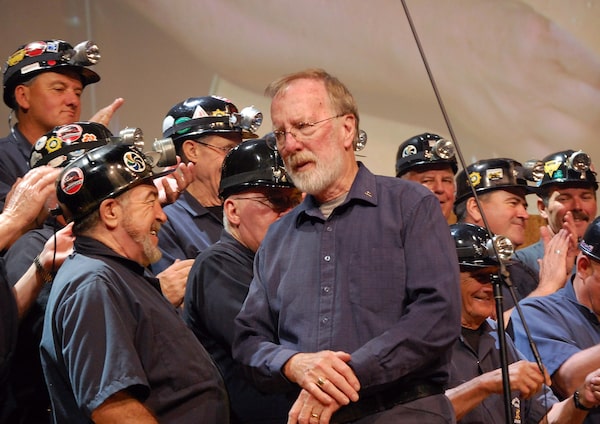A musician and teacher who served for 50 years as director of the well-known Cape Breton choir Men of the Deeps is being remembered for preserving the culture of coal miners through song.
John (Jack) O’Donnell died Thursday in Antigonish, N.S., surrounded by family. He was 83.

John (Jack) O'Donnell, centre, surrounded by the choir. (File Photo).Jenn Sheppard/Handout via The Canadian Press
Former miners who sang for him say while Mr. O’Donnell was trained in piano and Gregorian chant, he was also a down-to-earth leader who gained a passion for collecting and arranging songs about the lives of the soot-covered men who made their living underground.
Longtime choir member Stan (Nipper) MacLeod, 66, said many of the choir’s members had sung in church and around campfires, but Mr. O’Donnell taught them to sing in four-part harmonies that captivated audiences around the world.
They performed in their coveralls, work boots and hard hats with traditional miner’s lamps, in venues that have ranged from community centres to Massey Hall in Toronto.
“He had some hard work to do when he got ahold of a bunch of miners,” Mr. MacLeod said. “When he came on board, it was just somebody’s idea. Jack made it happen.”
The choir was formed in 1966 by Nina Cohen, who had founded the Miners’ Museum in Glace Bay, N.S. Its first director was Steve MacGillivray, but later that year Mr. O’Donnell was hired to conduct the choir and continued to do so until leaving for England in 1969.
When Mr. O’Donnell returned in 1973, the Cape Breton Development Corp. hired him on a full-time basis.
Stephen Muise, the current director of the Men of the Deeps, says he fell in love with their music as a boy, listening to his coal miner father learning the songs as a member of the choir. Eleven years ago, Mr. Muise became the assistant director, gradually taking over Mr. O’Donnell’s role as his mentor received treatment for cancer.
“Jack was able to transform these campfire singers into a polished act that tours the world,” he said. “His legacy is intertwined with the culture that comes from Cape Breton coal mining. Without Jack’s continued support and research of that particular field, that story could be lost.”
Perhaps the best-known example is Rita MacNeil’s song, Working Man, which Mr. O’Donnell reworked for the choir’s diverse voices – ranging from bass to tenor – fine tuning it into the choir’s signature piece.
Another song, Their Lights will Shine, by Ron MacDonald of New Glasgow, N.S., spoke of the tragedy of the Westray mining disaster, with the lyrics, “Time and space cannot part this bond among us / Trees and stone mark the sacred place to be.”
“Jack would often take songs that were written for a guitar player and a solo voice, and it was up to him to make it work for a 28-piece choir,” Muise recalled.
Muise said the story of coal mining is similar in parts of the United Kingdom or in West Virginia, and Mr. O’Donnell included folk songs from around the globe in the repertoire.
Often, Mr.O’Donnell’s gentle humour came into play, as he’d take on the persona of strict professor arguing on the stage with the miners about singing a country music tune, ending with a soloist donning a cowboy hat and defiantly proceeding with the tune.
In 1976, the Men of the Deeps became the first Canadian performing group to tour China after diplomatic relations were re-established in 1972.
The group also toured mining communities around North America under Mr. O’Donnell’s leadership.
Mr. O’Donnell was also a professor emeritus and former chair of the department of music at his alma mater, St. Francis Xavier University in Antigonish, where he worked for 40 years.
Mr. MacLeod says he’ll miss a teacher whose sharpest rebuke for an off-key note was, “There’s something a bit off with the tenors,” without singling out the perpetrator.
“He was the boss and the leader," he said, "but he was certainly one of us.”